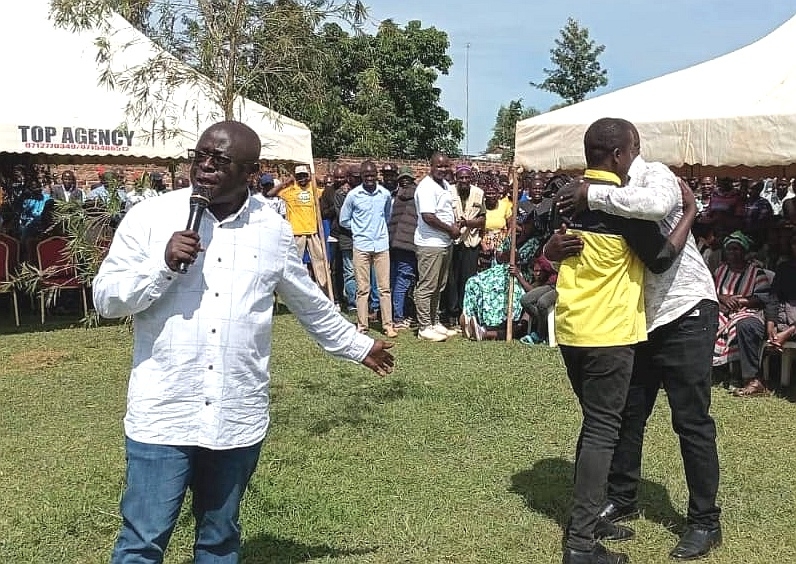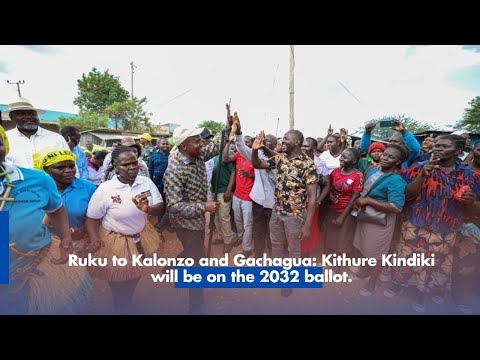The incoming East African Community Regional Force (EACRF) Commander Maj Gen Aphaxard Muthuri Kiugu assumed office in Goma in the Democratic Republic of Congo on Thursday, May 18, 2023.
Maj Gen Kiugu brings to the mission wealth of experience in military leadership, command and management in peace support operations having been previously deployed as a Disarmament, Demobilization, Reintegration and Repatriation Officer while serving with the UN Mission in Eastern DRC from 2003 to 2004.
He has also served as Defence Liason Officer in Kenya’s Permanent Mission to the United Nations, New York.
Maj Gen Kiugu was received at the Force Headquarters by the Deputy Force Commander (DFC) in charge of Intelligence and Operations - Brig Emmanuel Kaputa, DFC Administration and Logistics - Brig Ndorarigonya Gregoire, Chief of Staff - Brig Gen Michael Kibuye, Contingent Commanders and other Force Headquarters Staff Officers.
He noted that the EACRF has achieved significant milestones since the deployment in November 2022, including ensuring the withdrawal of M23 from previously occupied spaces and other tasks such as the protection of civilians and humanitarian support in areas the contingents' areas of operation.
He instructed the contingents to operate guided by the Status of Force Agreement and Rules of Engagement and advised them to keep reviewing tactics in conformity with the mission-changing dynamics so as to remain effective in the ongoing peace and stability efforts.
He also encouraged the contingent commanders to share their experiences for the benefit and success of the Regional Force.
“I am coming to pick from where Maj Gen Jeff Nyagah left and according to my assessment, you have done well. However, there are certainly lessons that we can learn from past experiences, that can enable us to improve towards the achievement of the desired end state.”
“I believe in cooperation and teamwork and I want to remind each one of us that we are one people of EAC with a common objective of enabling the citizens of Eastern DRC that are affected by insecurity to realize peace," he said.
He thanked the EAC Heads of State for finding it wise to establish a force intended to augment the current peace efforts in place, and the Government of DRC for the necessary facilitation.
The new force commander implored all to maintain the aim, remain focused, and continue with the efforts of ensuring M23 fully withdraws from the areas they occupied earlier to the designated localities per the Luanda Roadmap.
“We shall continue cooperating and collaboration with all stakeholders operating in the region including the various civil society entities so that we can leverage on each others' efforts and ideas,” added the Force Commander.
This came as Congolese President Félix Tshisekedi last week gave the biggest warning yet that the EACRF will have to leave the country by June if they are not effective on the ground.
On a visit to Gaborone in Botswana, where he has pushed for a plan B from the Southern African Development Cooperation (SADC) to send troops, the Congolese head of state accused the EACRF of ‘cohabiting’ with rebels after the regional troops declined to enter combat.
The head of state said that under the terms of the EACRF’s mandate, by next June, if the results of its mission are not satisfactory, this contingent, which came to the rescue of the DRC, will have to leave Congolese territory for good.
The Congolese president said this in his meeting with Botswana counterpart Mokgweetsi Masisi.
“The mandate of EACRF is ending in June, if by that time we assess that the mandate was not fulfilled, we will send those contingents home with honour and thank them for having tried to bring their share of contribution to peace in DRC.”
The EACRF, first deployed in November, includes troops from Kenya, Uganda, Burundi, and South Sudan.
Their Status of Force Agreement (SOFA), a pact between Kinshasa and the East African Community secretariat, initially gave them a mandate of six months which expired in March.
The EACRF says their mandate is peacekeeping and the protection of civilians while also supporting the political track on dialogue.
Tshisekedi revealed that the EAC Secretary-General Peter Mathuki had requested six months more for the troops.
But DR Congo gave them three months, up to the end of June.
The SOFA, nonetheless, has not been signed to formally extend the mandate yet.
The Congolese president wants SADC troops to fight the M23.
On Monday, a SADC summit in Windhoek, Namibia approved the deployment of its member troops to the DRC, although there was no immediate clarification on which countries would send forces.
Tshisekedi’s office has already announced that the SADC troops will have “an offensive mandate”.
SADC had once deployed troops to eastern DRC but still failed to end the menace of armed groups.
A UN experts panel accused the Southern Africa mission at the time of contributing to looting.
“We have accepted the EARCF to accompany FARDC to impose peace by trying to stop M23, which Rwanda supports. But, unfortunately, we have noticed certain contingents among this force, except Burundi, who is putting all the efforts into the mission as it was defined; other contingents are now living with M23, collecting taxes in the zone that they are illegally occupying. That’s a genuine problem, and it also compels us to question the purpose of the EAC mission.”
In the DRC, many are calling on the Congolese president to rely on the “natural allies” of the SADC.
In 1998, Zimbabwean, Namibian, and Angolan troops intervened to stop the advance of the RCD rebels in Kivu and Kinshasa.
Last month, EACRF’s commander Maj-Gen Jeff Nyagah left his station in unclear circumstances.
“We also have some officers of EACRF who, when they reached DRC, said that they were not coming to fight M23, which was not part of the plan. That was General Jeff’s problem,” said Tshisekedi.

















